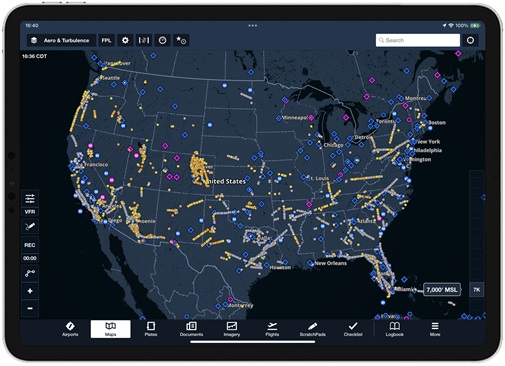 One big step closer to reality
One big step closer to reality
By Elizabeth Tennyson
The full Senate passed the Pilot’s Bill of Rights 2, which includes third class medical reform, by unanimous consent on December 15. The House must also pass the bill before it can go to the president for a signature.
“This is an enormous step toward getting long-awaited third class medical reforms,” said AOPA President Mark Baker. “This legislation will help hundreds of thousands of general aviation pilots by saving them time, money, and frustration while giving them tools they need to take charge of their health and fitness to fly.”
Sen. Jim Inhofe (R-Okla.) introduced the Pilot’s Bill of Rights 2 in the Senate in February 2015. Under the medical reforms of the bill, most pilots who have held a valid third class medical within 10 years of the legislation’s enactment would never need to get another FAA medical exam. The rule would apply to pilots flying VFR or IFR in aircraft weighing up to 6,000 pounds and carrying up to five passengers at altitudes below 18,000 feet and speeds up to 250 knots. Pilots who develop certain medical conditions will have to get an FAA special issuance medical one time only.
For pilots who have not had a valid medical in the past 10 years and those who have never received a medical certificate, a one-time third class medical certification will be required. After a pilot has been certified once, either through the regular or special-issuance process, he or she will also be able to fly indefinitely without going through the FAA medical certification process again.
After pilots have met these requirements, they will need to visit their personal physician once every four years for a medical exam, fill out a form, and provide it to the doctor performing the exam. The pilot must make a note of the visit and keep the signed form in his or her logbook. The form will include a short medical history questionnaire as well as a list of items the doctor must include in the examination. Following the exam, both the physician and the pilot must sign the form verifying that the items were examined and discussed.
During deliberations prior to passage of the bill by the full Senate, language was added requiring the physician to certify that he or she is not aware of any medical condition that, as it is currently being treated, would interfere with the ability to fly safely. No information about the exam needs to be provided to the FAA unless it is specifically requested.
In addition to the medical exam by a personal physician once every four years, pilots will be required to take a free online education course on aeromedical factors every two years.
Email [email protected]
Illustration by John Holm
Web: www.aopa.org/Third-class-medical-FAQs
Baker on the move
AOPA President Mark Baker serves on numerous corporate boards and has taken leadership roles with nonprofit organizations, including City of Hope, a top biomedical research, treatment, and education institution in Duarte, California.
Last month
January 11—State of the Industry roundtable
January 18—City of Hope, Las Vegas
January 22—Living Legends of Aviation, Los Angeles
This month
February 5—MITRE Aviation Advisory Committee, McLean, Virginia
February 22—AOPA Board Meeting, Palm Beach, Florida
February 25—NextGen Advisory Meeting, TBD
”General aviation has a lot to offer, and we have the power to share the fun, the freedom, and the amazing opportunities that come with being a pilot. That’s my challenge to every AOPA member. Share GA with someone today.”
Action in the states
Alaska Region
The Alaska Department of Transportation and Public Facilities is considering internal restructuring as a result of budget constraints. AOPA supports a move of the management of Part 139 regional hub airports under the Division of Statewide Aviation, which could streamline operation of the airports. AOPA Alaska Regional Manager Tom George and the Alaska Airmen’s Association advised the Alaska Civil/Military Aviation Council of the need for better communication channels for civilian pilots transiting military special-use airspace.
Northwest Mountain Region
Northwest Mountain Regional Representative Warren Hendrickson took part in a meeting of the Idaho Airstrip Network, presenting an update on regional issues including Utah’s addition of 12 new backcountry airstrips. The Washington State Aviation Alliance held its Airport Awareness Day in January. Also in Washington, the Northwest Aviation Conference and Trade Show is in Puyallup February 20 and 21. Hendrickson was to deliver an AOPA issues update at the Colorado Airport Operators Association’s Winter Conference in Denver in January. AOPA is supporting the Seaplane Pilots Association’s efforts to win aircraft access to Colorado Parks and Wildlife waterways.
Western Pacific Region
California’s Riverside Municipal Airport played host to a free public education seminar on the private use of unmanned aircraft. Officials from the city’s police and fire departments were on hand for the discussions centering on public safety, education, and best practices for operating drones. Airport Manager Kim Ellis said the seminar was important because the use of drones is increasing rapidly, but there hasn’t been a corresponding level of public education about what drones can and can’t do.
Central Southwest Region
In Texas, Regional Manager Yasmina Platt will deliver a free Pinch-Hitter safety seminar February 6. In Louisiana, Platt will meet with the Senate president and House speaker to discuss possible legislation for 2016. One bill would modify the state’s definition of “aviation gasoline” to include future replacement fuels and the other would require the marking and registration of meteorological evaluation towers. AOPA will participate in Kansas Aviation Day at the Capitol February 3 and the Nebraska Aviation Symposium January 27 and 28.
Great Lakes Region
AOPA Great Lakes Regional Manager Bryan Budds spoke in favor of Michigan’s aviation funding reform package before the Senate Commerce Committee. The legislation would ensure that a portion of the fuel taxes paid by pilots in Michigan is reinvested in the airport system. If approved, the legislation could result in approximately $5 million in additional general aviation airport funding annually. Budds appeared before the House Local Government Committee and met with committee members individually regarding the measure.
Southeast Region
In South Carolina, AOPA is working to form a general aviation legislative caucus. AOPA Director of State Government Affairs Jared Esselman met with Florida Gov. Rick Scott to discuss the economic impact of GA in the state. AOPA joins the Florida Aviation Business Association, National Business Aviation Association, and legislators in support of a bill to reduce and possibly eliminate Florida’s 6-percent sales tax on aircraft purchases. The state would benefit because jobs and sales-related revenue would stay in Florida.
Eastern Region
AOPA Director of State Government Affairs Jared Esselman attended a meeting of Pennsylvania’s Senate General Aviation Caucus, where lawmakers discussed the role of GA. In Massachusetts, AOPA Eastern Regional Manager Sean Collins spoke in support of a bill that aims to streamline approval for safety-related vegetation management projects such as tree trimming. Collins is working with the Connecticut Airport Authority on upcoming legislative efforts designed to support GA. AOPA is working to arrange a Rusty Pilots seminar in Maine. Also in Maine, Collins is working with local flying clubs to help promote GA, and was set to discuss the importance of GA with the Aeronautics Division of the Vermont Department of Transportation.
AOPA will submit formal comments on proposed rules for enforcing a law passed in Texas in 2015 that will require the marking and registration of meteorological evaluation towers (METs).


